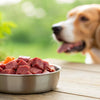Can I Add Raw Egg to Dog Food? Understanding the Benefits and Risks
- Houndsy
Table of Contents
- Introduction
- The Nutritional Profile of Eggs for Dogs
- Understanding the Risks of Feeding Raw Eggs to Dogs
- How to Safely Incorporate Eggs into Your Dog's Diet
- Observing for Allergies and Reactions
- Answering Common Questions about Feeding Eggs to Dogs
- Conclusion
Introduction
Imagine this: it's breakfast time, and you're enjoying your scrambled eggs while your pup watches you with eager eyes, begging for a taste. Many dog owners find themselves grappling with the question, "Can I add raw egg to dog food?" It's a common inquiry, given that eggs are often touted as a nutrient-dense treat for our furry friends. However, while eggs can indeed be beneficial, the raw variety comes with a slew of safety concerns that warrant careful consideration.
In this blog post, we aim to demystify the subject of feeding eggs to dogs, emphasizing the importance of understanding both the potential benefits and risks. As we navigate through this topic, we’ll explore the nutritional value of eggs, the health implications of feeding them raw, and provide recommendations for safe feeding practices.
By the end of this article, you will not only answer the question "Can I add raw egg to dog food?" but also equip yourself with valuable insights on integrating eggs into your pet’s diet safely. So, let’s dive in and reflect on our own feeding routines, discovering how to enrich our dogs' meals while keeping them safe and healthy.
The Nutritional Profile of Eggs for Dogs
1. Nutritional Benefits
When considering whether to add eggs to our dogs' diets, it's essential to understand what they bring to the table. Eggs are nutritional powerhouses, packed with:
- Protein: Eggs are rich in high-quality protein, which is crucial for your dog's muscle development and overall health.
- Vitamins and Minerals: They contain essential vitamins such as Vitamin A, B vitamins (including B12 and riboflavin), and minerals like iron and selenium.
- Healthy Fats: The fats found in eggs—specifically omega-3 fatty acids—are known to contribute to healthy skin and a shiny coat.
These nutrients can support various aspects of your dog's health, from immune function to digestive health. However, it's important to note that while eggs are nutritious, they should complement a balanced diet rather than serve as a primary food source.
2. Cooking Versus Raw
Cooking eggs can enhance their nutritional profile by making certain nutrients more bioavailable and eliminating harmful bacteria. Here’s a breakdown:
- Raw Eggs: While raw eggs do retain a higher level of certain vitamins, they pose risks, including the potential for salmonella and biotin deficiency, as mentioned previously.
- Cooked Eggs: Cooking eggs reduces the risk of foodborne pathogens. Scrambled or hard-boiled eggs are particularly safe options, allowing nutrients to be absorbed without the risks associated with raw consumption.
Incorporating cooked eggs into your dog's diet can serve as an excellent occasional treat or a supplement to their regular food.
Understanding the Risks of Feeding Raw Eggs to Dogs
1. Salmonella Exposure
One of the foremost concerns with raw eggs is the risk of salmonella infection. While dogs generally have robust digestive systems that can handle bacteria better than humans do, they can still fall ill if they consume contaminated eggs. Symptoms of salmonellosis in dogs may include:
- Diarrhea
- Vomiting
- Fever
- Lethargy
Moreover, pet owners themselves can be at risk when handling raw eggs, further emphasizing the need for caution.
2. Biotin Deficiency
Another risk to consider is the potential for biotin deficiency associated with consuming raw egg whites. Raw egg whites contain avidin, a protein that binds to biotin and prevents its absorption. Biotin is vital for healthy skin, coat, and metabolism. While deficiencies are quite rare, they can lead to adverse health effects if excessive amounts of raw eggs are consumed over time.
3. Bacterial Infections
Additionally, as eggs age, they can grow bacteria that may be harmful to dogs. When considering feeding your dog eggs, it's essential to ensure that they are fresh and from a trusted source.
How to Safely Incorporate Eggs into Your Dog's Diet
1. Cooked Egg Preparation
When contemplating whether or how to add eggs to your dog’s food, here are a few safe cooking methods:
- Hard-Boiled: Boil the eggs and chop them into small pieces or serve them whole, ensuring there are no additives like salt or butter.
- Scrambled: Cook eggs in a non-stick pan without any oils or seasonings. Scrambled eggs can also be served as a topping to entice picky eaters.
2. Portion Control
As with any dietary addition, moderation is paramount. The appropriate number of eggs can depend on several factors:
- Size of the Dog: For small dogs, one egg per week may suffice, while larger breeds could handle up to three eggs per week.
- Current Diet: If your dog is already consuming a high-quality, balanced diet, additional eggs may not be necessary.
Discussing portion sizes with your veterinarian can help you establish the best approach based on your dog’s health and dietary needs.
Observing for Allergies and Reactions
1. Egg Allergies in Dogs
While eggs can be nutritious, it’s essential to keep an eye out for any signs of allergies, particularly when adding them as a new food item. In general, dogs are just as likely to develop food allergies as humans, and the symptoms can include:
- Vomiting or diarrhea
- Hives or swelling
- Breathing difficulties
If your dog exhibits any of these symptoms after consuming eggs, it’s crucial to consult your veterinarian promptly to rule out any serious concerns.
2. Introducing Eggs Gradually
When introducing eggs into your dog's diet, it’s wise to start slowly. Begin with a small portion to gauge their reaction. If all goes well, you can gradually increase the serving size while continuing to monitor for any signs of allergies or digestive issues.
Answering Common Questions about Feeding Eggs to Dogs
1. Can Dogs Eat Eggshells?
Yes, dogs can eat eggshells, which are rich in calcium. However, they should be ground into a fine powder to avoid choking hazards. Too much calcium can be detrimental, so consult your vet beforehand.
2. What About Different Cooking Methods?
While boiled and scrambled eggs are the safest options, fried eggs should be avoided due to the unhealthy oils and fats. Also, ensure no seasoning or additives are included, which can pose risks to your dog's health.
3. How Often Can I Feed My Dog Eggs?
Context matters! For most dogs, eggs can be an occasional treat. However, it's best to consult with your vet for personalized recommendations based on your dog's dietary needs and health profile.
4. What Should I Do If My Dog Eats a Raw Egg?
If your dog consumes a raw egg, keep an eye on them for any symptoms of illness—especially signs of salmonellosis. If any concerning symptoms appear, contact your veterinarian.
Conclusion
Incorporating eggs into your dog’s diet can undoubtedly provide nutritional benefits, but it also comes with associated risks, particularly when served raw. By ensuring that eggs are cooked properly and offered in moderation, we can enrich our pets' diets safely.
As responsible pet owners, it is vital to stay informed and consult with veterinarians on dietary additions that best suit our pups. If you're inspired to simplify your dog's feeding routine, consider how the Houndsy Kibble Dispenser can contribute to this.
It offers a convenient way to serve your dog’s food while keeping your home organized and stylish. Explore the Houndsy Kibble Dispenser today to elevate your dog's mealtime experience!
FAQ
Can I add raw eggs to my dog's food?
While it's possible, the risks of salmonella and biotin deficiency make it advisable to cook eggs before adding them to your dog's diet.
How many eggs can I feed my dog each week?
For small dogs, one egg per week is ideal; larger breeds may eat up to three. Always consult your veterinarian for personalized advice.
What should I do if my dog shows allergy symptoms after eating eggs?
Contact your veterinarian immediately if you notice symptoms such as vomiting, diarrhea, or swelling.
Can eggs be a primary food source for dogs?
No, eggs should supplement a balanced diet rather than replace main meals. They work best as an occasional treat.
Are eggshells safe for dogs?
Yes, but they should be ground into a powder to prevent choking. Always check with your vet on the appropriateness of eggshells in your dog's diet.












